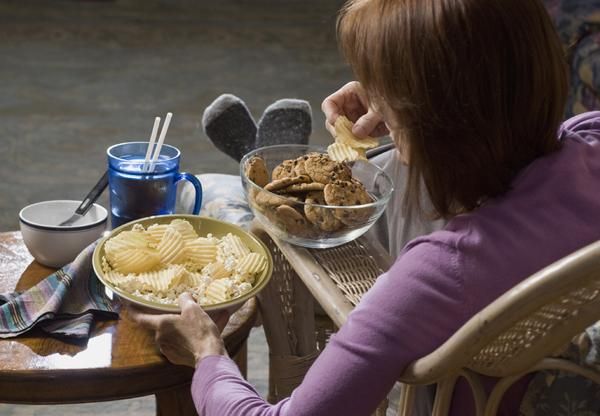Wild Stock Market Could Make You Eat More

If you find yourself opting for a slice of cake over a piece of fruit for dessert, even though you know it's loaded with calories, it may not be your fault. A combination of bad news about the economy and your survival instincts may be to blame, according to a new study.
People who are led to think resources are scarce pick high-calorie foods over low-calorie ones, the study found.
News of the stock market crash or high unemployment levels might activate a "survival mindset," said study researcher Anthony Salerno, a doctoral student in the department of marketing at the University of Miami.
Having this mindset means that people feel their resources are in jeopardy, so they may compensate by choosing calorie-rich, life-sustaining foods, Salerno said.
To stay healthy, consumers should be aware that subtle cues "could have potentially big differences in what people wind up ordering on a day-to-day basis," Salerno said.
Survival mindset
In their study, Salerno and colleagues "primed" study participants to have a survival mindset. They told the participants they were taking a test of verbal ability. Participants saw a series of letters and were told to hit a button if the letters spelled a word. For half of the participants, most of the words were related to survival, including "deprivation" and "withstand."
Sign up for the Live Science daily newsletter now
Get the world’s most fascinating discoveries delivered straight to your inbox.
Participants were then asked to rate the desirability of certain foods. Those primed to have a survival mindset were more likely to prefer a high-calorie sandwich to a low-calorie one. In contrast, those primed withan "abundance" mindset (with words such as "plenty" and "ample") preferred a low-calorie sandwich.
In a second experiment, participants were primed with either a survival mindset or one of pleasure (using words such as "indulgence" and "pleasantness"). Participants primed with the survival mindset were more likely to want a 12-inch submarine sandwich that was labeled as "high calorie" over a one that was called "tasty." For those with the pleasure mindset, the opposite was true.
Do calories on menus work?
The results suggest posting calorie information to restaurant food menus may have an effect that's opposite to the one intended.
For people in survival mode, calorie information "could actually make people order worse foods or higher calorie foods, basically with this idea of getting as much bang for your buck as possible," Salerno said.
Others, however, disagree with this conclusion.
"I don’t think it means anything for calorie posting," said Eric Finkelstein, an associate professor of health services at Duke-National University of Singapore Graduate Medical School. "There are now enough studies showing that [calorie posting ] has very little effect — positive or negative — regardless of how people's brains are wired," Finkelstein said.
The studies were conducted in a laboratory, so it's not clear whether the results apply in the real world.
Salerno said he plans to conduct a follow-up study in which participants are primed by reading manufactured newspaper articles that are survival-themed.
The study was presented Aug.5 at the annual meeting of the American Psychological Association in Washington, D.C.
Pass it on: Subconsciously thinking resources are scarce may prompt you to choose high-calorie foods.
This story was provided by MyHealthNewsDaily, a sister site to Live Science. Follow MyHealthNewsDaily staff writer Rachael Rettner on Twitter @RachaelRettner. Find us on Facebook.

Rachael is a Live Science contributor, and was a former channel editor and senior writer for Live Science between 2010 and 2022. She has a master's degree in journalism from New York University's Science, Health and Environmental Reporting Program. She also holds a B.S. in molecular biology and an M.S. in biology from the University of California, San Diego. Her work has appeared in Scienceline, The Washington Post and Scientific American.











